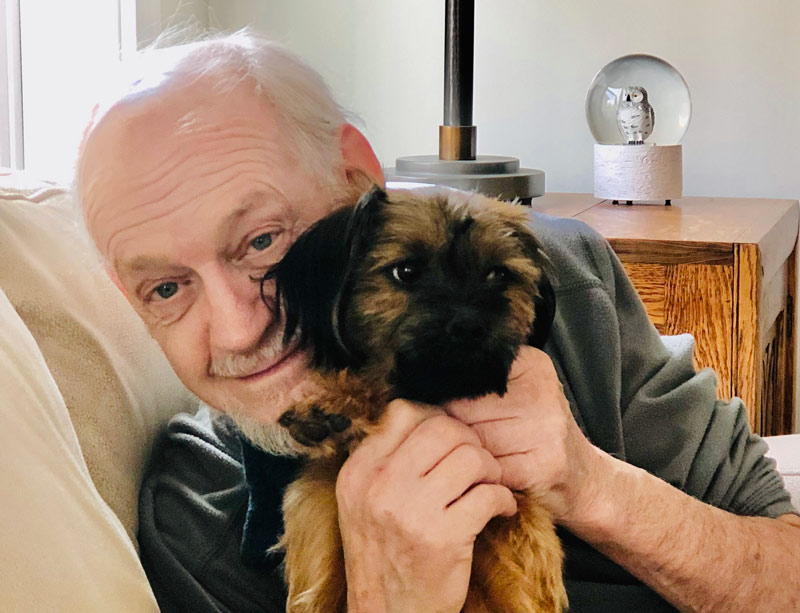Mesothelioma Survivor Saved by Keytruda, Long-Distance Advice

Wally Rogers should be back on the ski slope by early December, strong enough to cruise comfortably down picturesque Harper Mountain, not far from his home in Kamloops, British Columbia.
Life is good again.
At age 75, Rogers has overcome mesothelioma cancer.
He is a four-year mesothelioma survivor who has staged a miraculous recovery after taking the advice of a scientist at an innovative cancer center 1,100 miles away.
Desperation brought them together — thanks to his wife, Rena, who refused to give up.
After chemotherapy side effects reduced him to a shell of his once-strapping self, and the tumor cells began growing again, they found Emma Shtivelman, chief scientist at Cancer Commons in Los Altos, California.
“Emma was a godsend at the right time,” Rogers proclaimed. “Literally a lifesaver for me.”
Keytruda Worked Wonders
After reviewing his records and talking long-distance to the couple, Shtivelman urged them to try Keytruda (pembrolizumab), the novel immunotherapy drug that is getting mixed reviews from various specialists.
“Keytruda is not the answer for everyone,” Shtivelman told The Mesothelioma Center at Asbestos.com when asked about Rogers. “But here was a chance of him getting a really good result. When it works, the response tends to be long lasting.”
Instead of restarting another debilitating round of chemotherapy that would soon fail him, Rogers started a Keytruda regimen in March 2018.
Follow-up tests showed an almost immediate effect on the hard-to-treat cancer.
Rogers discontinued using Keytruda in October 2018, believing the drug and its side effects were at least partially responsible for the hemorrhage in the retina of his left eye. CT scans also showed no sign of remaining mesothelioma tumor cells.
They were gone.
“At this point, I don’t want to use the word ‘cured,’ because they need five years to say that, but every time our oncologist here sees an X-ray or CT scan, he’s amazed,” Rogers said. “Nothing has come back. One of the health care workers here calls me his ‘miracle boy.’”
Ready for Snow Skiing Again
Rogers has been working out regularly, lifting weights and regaining strength with hikes through the countryside where he lives.
He spends considerable time now with his two grandchildren who live nearby. He and Rena are back doing volunteer work in the community.
Rogers has regained his love of cooking, particularly the ethnic dishes he does so well. He doesn’t sit still for very long.
“I have plans to ski again this winter. I used to be pretty good at it. Downhill skiing can be a strenuous sport. I want to be back in shape to do that, get back into it and enjoy that mountain air,” he said. “I want to be around for my family. We’re enjoying this life extension.”
Rogers already has beaten the long odds. Diagnosed with the sarcomatoid subtype of mesothelioma, he was not expected to live more than a year, even with the aggressive chemotherapy treatments.
He also knew that Keytruda only worked well for a small percentage of patients, and he actually lacked the molecular biomarkers (PD-1 and PDL-1) that some researchers believe increase the odds of success with immunotherapy drugs.
“It’s a real mystery at this point why I’ve done so well. After listening to the medical people, it’s almost shocking,” he said. “I’m not superhuman by any means. I’m a simple man. Maybe I can let people know, there is hope out there.”
Helping Others with His Success
Part of his motivation today is to advance treatment by discovering why he has been the exception to the rule, which says patients with sarcomatoid mesothelioma don’t last very long.
Rogers wants to help others, which is part of his and Rena’s nature. He worked earlier in his life as a drug and alcohol counselor in Vancouver, spending many nights with struggling addicts. Rena worked in the local school system with special needs children.
They are givers.
When Wally was struggling through mesothelioma treatment earlier, Rena spent hours researching possible alternatives and cancer centers, which is how she found Shtivelman in California.
He survived a horrific car crash 15 years ago that left him with serious head and chest injuries, needing almost a decade to recover completely. Rarely did either of them complain.
His impaired vision today is hardly a factor in his daily routine.
During Wally’s treatment for pleural mesothelioma — even when he felt terrible after losing 40 pounds — he often encouraged the young nurses to provide a more positive environment on the cancer floor.
He counseled other patients, too.
“I’ve always believed that when things are going well for you, you should share it with others. We’re always trying to help others going through tough times,” he said. “You may have it bad at times, but there is someone having it worse. If someone else needs a hand, I’m going to try and help them.”
Rogers never was afraid of dying, even when things looked bleak. For years, he lived his life day-to-day and without any long-term plans.
He loved sharing the great outdoors with others and was always excited about seeing what adventure the next day would bring.
“It’s a whole different way of living, moment to moment, kind of a Zen type of existence,” he said. “It’s a little difficult for Rena, who likes to plan things. I live hour to hour.”
Although they never have met Shtivelman in person — communicating only by long distance — they speak of her like family.
“She was always there when we needed her,” Wally said. “I wouldn’t be around today without her, and the help she gave us. You don’t forget something like that.”